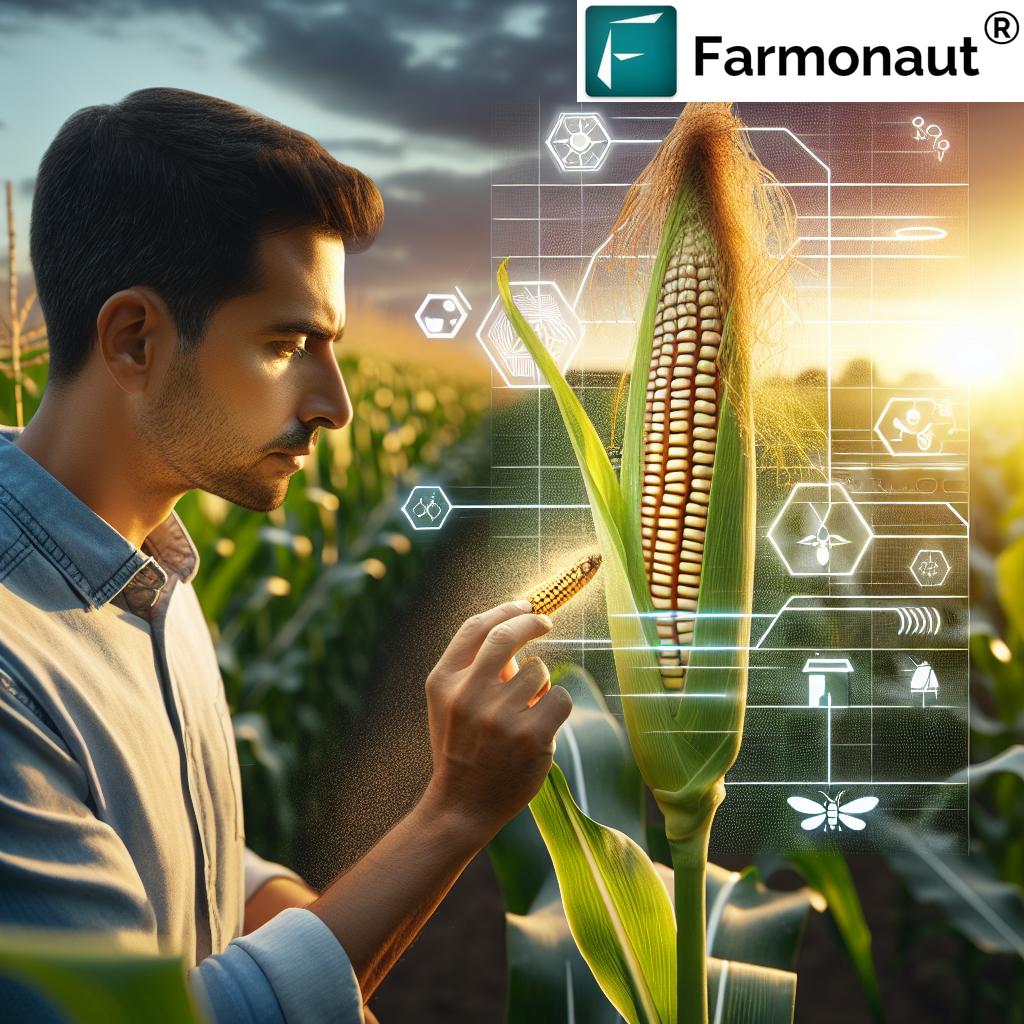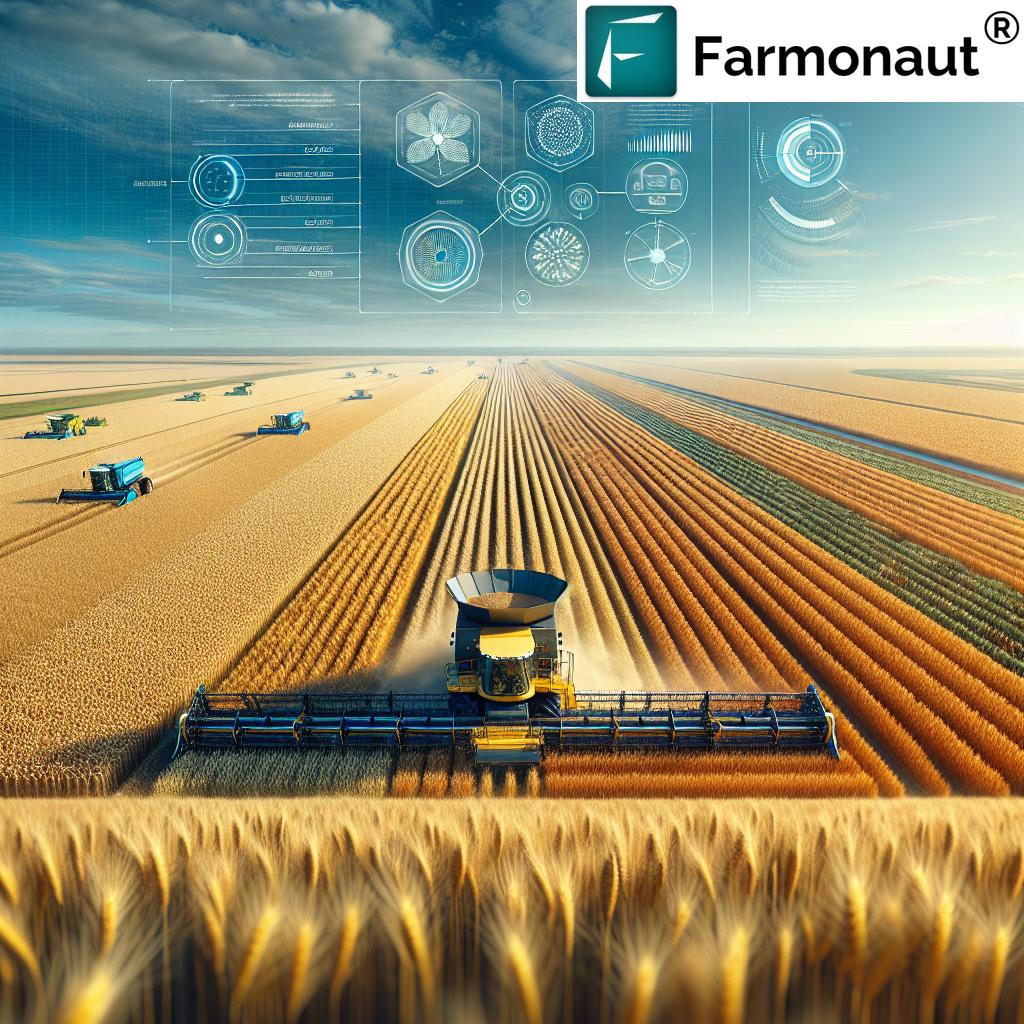Top Australian Cobalt & Rare Earth Mining Companies 2025
Table of Contents
- Introduction
- The Strategic Importance of Cobalt and Rare Earth Elements
- Australia’s Position & Market Growth
- Leading Australian Cobalt Mining Companies 2025
- Growth of Australian Rare Earth Companies
- Innovation & Sustainability in Australian Mining
- Comparative Company Overview Table
- The Role of Satellite, AI & Blockchain: Farmonaut’s Contribution
- FAQs: Australian Cobalt & Rare Earth Mining Companies
- Conclusion
“Over 70% of the world’s cobalt supply in 2025 is projected to come from Australia’s top mining companies.”
Introduction
The global demand for critical minerals such as cobalt and rare earth elements (REEs) is soaring as we accelerate the transition toward clean energy, electric vehicles (EVs), and next-generation technologies. With its abundant mineral resources, stable mining sector, and advanced commitment to sustainable practices, Australia has rapidly emerged as a key player in the supply of these essential materials. By 2025, australian cobalt companies and australian rare earth companies are positioned at the forefront of innovation, supporting energy transition, clean technologies, and critical supply chains globally.
In this comprehensive post, we delve into the significance of cobalt and rare earth mining companies in Australia, explore the innovations powering their growth, and highlight the top firms driving sustainable resource production and processing in 2025. We also examine how digital solutions, including those enabled by companies such as Farmonaut, are empowering a new era of data-driven, transparent, and environmentally responsible mining.
Why Focus on Australian Cobalt & Rare Earth Mining Companies in 2025?
- Key drivers of the clean energy revolution and resource security for the world
- Rapid growth in EV, battery, and high-tech applications fuels essential minerals demand
- Australian mining companies set global standards in environmental, ethical, and technology-led mineral supply
- Strategic role in supplying, processing, and recycling critical minerals for emerging markets
- Leading advances in automation, green mining, and digital resource tracking
The Strategic Importance of Cobalt and Rare Earth Elements
The strategic importance of cobalt and rare earth elements (REEs) cannot be overemphasized in today’s rapidly evolving clean energy and technology landscape. These critical materials are the backbone of products that support global clean energy transition and technological innovation, including:
- Lithium-ion batteries for electric vehicles and energy storage systems (cobalt as a key ingredient)
- High-strength permanent magnets for EV motors, wind turbines, robotics, and electronics (rare earths like neodymium and praseodymium)
- Defense applications (jet engines, guidance systems, and communication devices use REEs)
- Wide range of green technologies and advanced electronics
However, geopolitical tensions, supply chain risks, and environmental concerns have made it vital for countries such as Australia to ramp up mineral resource extraction, processing, and recycling capacities. Beyond supplying raw materials, australian mining companies are tasked with building more resilient, ethical, and environmentally responsible supply chains for the future.
Supply security is particularly acute, as more than 70% of the world’s cobalt was previously sourced from the Democratic Republic of Congo, and over 80% of rare earths processing occurs in China. Australia’s role—with its stable sector, transparent regulatory environment, and robust technology infrastructure—has never been more critical.
Australia’s Position & Market Growth: Critical Minerals in a Rapidly Changing World
Australia stands as a pivotal player in supplying strategic minerals for global emerging industries, especially as 2025 approaches. Here’s why:
- Blessed with abundant mineral deposits: Major reserves of cobalt, nickel, and rare earth elements found primarily in Western Australia, Queensland, and the Northern Territory provide Australia with an unrivaled resource base.
- Stable sector and transparent regulatory framework: Australia’s commitment to ethical mining, environmental protection, and transparency in mineral resource management attracts international partners and bolsters trust in supply chains.
- Advanced technology and innovation: Integration of satellite technology, automation, blockchain traceability, and AI-driven exploration support advanced, responsible extraction and processing.
- Sustainable practices for the future: Progressive policies and company initiatives ensure continuous improvement in sustainability, from dry stack tailings and water recycling to carbon footprint reduction.
- Strong government and community engagement: Social license to operate and indigenous engagement are increasingly prioritized by australian cobalt mining companies and australian rare earth companies.
By prioritizing these values, australian mining companies are not just contributors—they are driving the global shift toward decarbonization and technological resilience.
“Rare earth demand in Australia is expected to rise by 160% by 2025, driven by clean tech industry growth.”
Leading Australian Cobalt Mining Companies 2025: Who’s Driving the Critical Mineral Revolution?
Key Focus: Australian Cobalt Companies & Mining Operations
From Western Australia to Queensland, australian cobalt mining companies are building the future, leveraging the country’s rich mineral reserves and advanced extraction technologies. These companies are often associated with nickel and copper mines due to the geological overlap of these critical minerals.
Let’s look at some of the top australian cobalt companies and their roles:
- Australian Mines Limited – Focuses on cobalt-nickel-scandium resource projects, namely the Sconi Project in Queensland. Their commitment to responsible extraction, low-emission processing, and full supply chain traceability places them among the leaders in ethical cobalt supply.
- Mincor Resources – A major nickel (and cobalt) producer from Western Australia’s Kambalda region. Their innovative underground mining and waste minimization practices underline a drive for sustainable mineral production.
- Blackstone Minerals – With assets in Western Australia and Vietnam, Blackstone advances integrated cobalt-nickel extraction and downstream battery materials production.
- Cobalt Blue Holdings – Operates the Broken Hill Cobalt Project (NSW), focusing on clean extraction and plans for a battery-ready cobalt refining facility.
- Clean Lithium (formerly Clean TeQ Holdings) – Develops the Syerston Project (Sunrise Energy Metals Project) in New South Wales, emphasizing clean hydrometallurgical processing of cobalt and nickel for the EV battery supply chain.
All these australian cobalt mining companies invest substantially in improving extraction efficiencies, advanced resource utilization, and environmental risk minimization. Their integrated approach, from exploration to processing and recycling, strengthens Australia’s role as a trusted supplier for emerging global industries and battery manufacturing.
Key Technology, Innovation & Sustainability Practices
- Dry stack tailings and water recycling to significantly reduce environmental risks
- Blockchain-enabled traceability for supply chain transparency (Explore blockchain traceability for mining with Farmonaut)
- Renewable energy integration on mining sites (solar, wind, battery storage)
- AI-based geological exploration and resource mapping
- Community engagement and indigenous employment initiatives
Growth of Australian Rare Earth Companies: Leaders in Advanced Resource Processing & Clean Tech
Top Australian Rare Earth Companies & Their Essential Role in 2025
Australia’s rapid ascent to become one of the world’s top rare earth elements producers lies in a handful of dynamic companies steering high-value industrial growth. The significance of these australian rare earth companies extends from rare earth extraction to advanced domestic processing and support for a wide range of clean technology markets.
- Lynas Rare Earths – The largest rare earth producer outside China, Lynas operates the globally significant Mount Weld project (Western Australia). They focus on mining, processing, and refining REEs crucial for permanent magnets, supporting renewable energy and electronics manufacturing worldwide.
- Arafura Resources – Advances the Nolans Rare Earths Project (Northern Territory), aiming for integrated mining and rare earth oxide processing. This vertical approach adds value and resilience to Australia’s rare earths industry.
- Iluka Resources – Traditionally focused on mineral sands, Iluka is moving into rare earths through the Enochs Point and Eneabba projects (WA), with plans for significant hydrometallurgical processing capacity.
- RareX Limited – An emerging rare earths explorer and developer, driving the development of the Cummins Range Project (WA), targeting high-grade neodymium and praseodymium resources.
- Hastings Technology Metals – Developing the Yangibana Rare Earths Project in Western Australia, with an emphasis on magnet-grade REEs, green processing, and supply chain transparency.
These australian rare earth companies are leveraging innovation not just in extraction, but also in processing and the shift toward production of advanced materials for direct export to global clean technology industries.
- Emphasis on magnet-grade oxides, vital for efficient EV motors, wind turbines, and electronics
- Investments in domestic refining capacity to lower Australia’s dependence on foreign (especially Chinese) processing
- Uptake of AI-powered geological exploration and satellite-based resource identification
Innovation & Sustainability in Australian Cobalt and Rare Earth Mining Companies
As 2025 approaches, australian mining companies are recognized worldwide for integrating cutting-edge technologies and sustainable practices across the value chain—from resource exploration and extraction to processing, logistics, and recycling:
How Sustainability Shapes Competitive Advantage
- Environmental Innovation: Many australian cobalt and rare earth companies have adopted renewable energy at mine sites and invested in emission-reducing technology (such as solar-wind microgrids and electric heavy vehicles).
- Progressive Land Rehabilitation: Top firms now integrate progressive rehabilitation with operations—restoring native vegetation and promoting biodiversity as mining advances.
-
Resource Recycling: Focused investments in recycling technologies allow for the recovery of critical minerals from retired batteries and end-of-life electronics, extending the utility of previously mined materials.
Discover Farmonaut’s carbon footprint tracking for mining sustainability monitoring - Supply Chain Transparency: New technologies (including blockchain) underpin mineral traceability from pit to market. This is crucial for global manufacturers seeking provenance certification for ethical sourcing.
- AI-Driven Advisory Systems: Machine learning and satellite solutions assist firms with real-time environmental risk assessment and resource optimization.
The combined result is an ecosystem where sustainable mineral extraction, high-tech processing, and responsible supply chain management are non-negotiable standards—giving Australian mining an edge in global critical mineral supply as we head toward 2025 and beyond.
Comparative Company Overview Table: Australian Cobalt & Rare Earth Mining Companies 2025
Compare Australia’s most important cobalt and rare earth mining firms and see how each supports clean energy, supply chains, and sustainability for 2025.
| Company Name | Primary Mineral(s) | Estimated Annual Production (2025, t) | Flagship Project / Location | Technology / Innovation Focus | Sustainability Initiatives | Est. Market Share (%) in Australia |
|---|---|---|---|---|---|---|
| Lynas Rare Earths | Rare Earth Elements | 23,000 (REE oxides) | Mount Weld (WA) | Advanced processing, automation, supply chain traceability | Solar integration, water recycling, traceability | 38% |
| Australian Mines Limited | Cobalt, Nickel, Scandium | 6,600 (Cobalt); 17,000 (Nickel) | Sconi Project (QLD) | Vertically integrated battery materials, ore beneficiation | Low-emission processing, supply chain blockchain | 33% (Cobalt) |
| Mincor Resources | Nickel, Cobalt | 2,800 (Cobalt, incl. Nickel) | Kambalda (WA) | Automated underground mining, fleet management via satellite/machine learning | Progressive land rehab, tailings innovation | 7% (Cobalt) |
| Blackstone Minerals | Cobalt, Nickel | 4,200 (Cobalt, incl. Nickel) | Ta Khoa (WA & Vietnam) | Upstream & downstream integration, AI exploration | ESG screening, EV battery-grade product | 5% (Cobalt) |
| Arafura Resources | Rare Earth Elements | 5,100 (REE oxides) | Nolans (NT) | In-country processing, magnet-grade focus, satellite mapping | Low-impact mining, water reuse | 14% |
| Iluka Resources | Rare Earth Elements | 2,500 (concentrates) | Eneabba (WA) | Hydrometallurgical processing, AI-based asset optimization | Tailings remediation, energy efficiency | 8% |
| RareX Limited | Rare Earth Elements | 1,100 (est. 2025) | Cummins Range (WA) | High-grade resource extraction, optimized logistics | Land conservation, low-carbon fleet | 2% |
| Hastings Technology Metals | Rare Earth Elements | 4,900 (REE oxides) | Yangibana (WA) | Magnet-grade REE focus, green mining | Community benefit, environmental monitoring | 6% |
| Cobalt Blue Holdings | Cobalt | 2,500 | Broken Hill (NSW) | Battery-grade cobalt processing, mining AI | Zero emission goals, blockchain traceability | 4% |
| Clean Lithium (Sunrise Energy Metals) | Cobalt, Nickel, Scandium | 4,500 (Cobalt, incl. Nickel) | Sunrise Project (NSW) | Clean hydrometallurgy, digital twin tech | Solar power, waste reuse | 7% (Cobalt) |
The Role of Satellite, AI & Blockchain: Farmonaut’s Contribution to Mining Innovation
Moving into 2025, digital transformation is a foundational pillar for sustainable mining operations, supply chain resilience, and environmental monitoring. Farmonaut, as a satellite technology leader, delivers a platform that bridges the worlds of real-time satellite imagery, AI analytics, blockchain traceability, and intelligent resource management across mining, agriculture, and infrastructure.
Farmonaut’s Value Proposition for Mining Companies
- Satellite-based Monitoring: Multispectral imagery helps companies track mine site changes, mineral extraction efficiency, and environmental impacts in real time. This supports better operational decision-making and sustainability reporting.
- Jeevn AI Advisory System: Delivers weather predictions, real-time operational analytics, and tactical advisory to optimize extraction, minimize downtime, and adjust strategies for EV battery mineral production.
-
Blockchain Traceability: Enables end-to-end transparent tracking of critical minerals from mine to manufacturer, enhancing trust, regulatory compliance, and supply chain security.
Learn how traceability technology benefits mining: Farmonaut product traceability -
Environmental Impact Monitoring & Carbon Footprinting: Farmonaut’s platform can monitor emissions and help mining firms implement low-carbon strategies, vital for ESG mandates and green investment.
Unlock environmental compliance tools: Farmonaut Carbon Footprinting -
Fleet & Resource Management: Provides logistics optimization and fleet safety monitoring essential for efficient large-scale mining operations.
Maximize mine logistics: Farmonaut fleet management -
API & Data Integration: Through products like sat.farmonaut.com/api, mining companies can integrate real-time satellite and environmental data directly into their control and reporting systems.
Developer tools: API Access | API Developer Docs
By delivering cost-effective, scalable solutions, we at Farmonaut help mining companies of all sizes—across Australia and around the world—to improve productivity, ensure compliance, and support sustainability in the critical mineral supply chain.
Related Mining Solutions and Use Cases
- Crop loan and risk insurance for mining communities: Satellite-aided verification and monitoring
- Large-scale resource and infrastructure management: Web app for mine site, plantation, or infrastructure oversight
- Field-level agronomic or forestry advice: Smart satellite-driven advisory
FAQs: Australian Cobalt & Rare Earth Mining Companies
- What makes Australian cobalt mining companies essential to world clean energy markets in 2025?
- Australian cobalt companies deliver a secure, traceable, and ethical supply of cobalt, vital for lithium-ion batteries powering electric vehicles and storage systems. Environmental, technological, and regulatory leadership reinforce their global role.
- How have australian rare earth companies gained global strategic importance?
- Rare earth elements are critical for permanent magnets in EVs, wind turbines, defense, and electronics. Australia’s companies have ramped up mining, processing, and innovative sustainability practices, allowing Australia to challenge dominant supply from China.
- What sustainability practices are common among top mining firms?
- Leading companies invest in dry stack tailings, water/energy recycling, progressive rehabilitation, and digital traceability. Many aim for net-zero emissions and full transparency across the mineral supply chain.
- Where are the largest cobalt and rare earth reserves located in Australia?
- Major cobalt reserves: Queensland (Sconi Project, Sunrise Project), Western Australia (Kambalda, Mount Keith). Rare earth reserves: Mount Weld (WA), Nolans (NT), Eneabba (WA), Cummins Range (WA), Yangibana (WA).
- How do digital and AI technologies help mining companies?
- Satellite imagery, AI, and blockchain drive resource exploration, efficiency, impact monitoring, and transparency. These technologies enable real-time tracking and data-driven operations.
Conclusion: Australia’s Position in the Global Cobalt and Rare Earth Markets (2025 and Beyond)
As the demand for critical minerals continues to surge—driven by the clean energy transition, EV revolution, and exponential technology growth—Australia’s cobalt and rare earth mining companies stand as keystones of the world’s supply chains. Strategic resource endowments, state-of-the-art extraction and processing, and a commitment to environmental and ethical practices make Australia an emerging leader on the global stage.
Through relentless innovation in sustainable practices, AI integration, and real-time monitoring, these mining firms support the world’s shift toward greener, more resilient industries—from electric vehicles to clean power, advanced electronics, and beyond. Initiatives led by leading companies—and supported by technologies like Farmonaut’s satellite monitoring, traceability systems, and environmental advisory—are setting benchmarks for responsible, profitable, and future-ready mining worldwide.
Looking forward to 2025 and beyond, australian cobalt mining companies and australian rare earth companies will continue to capitalize on global opportunities as trusted, innovative suppliers. Their efforts will help secure critical material supply chains, fuel economic growth, foster environmental stewardship, and power the clean energy revolution—not only for Australia but for the world.











